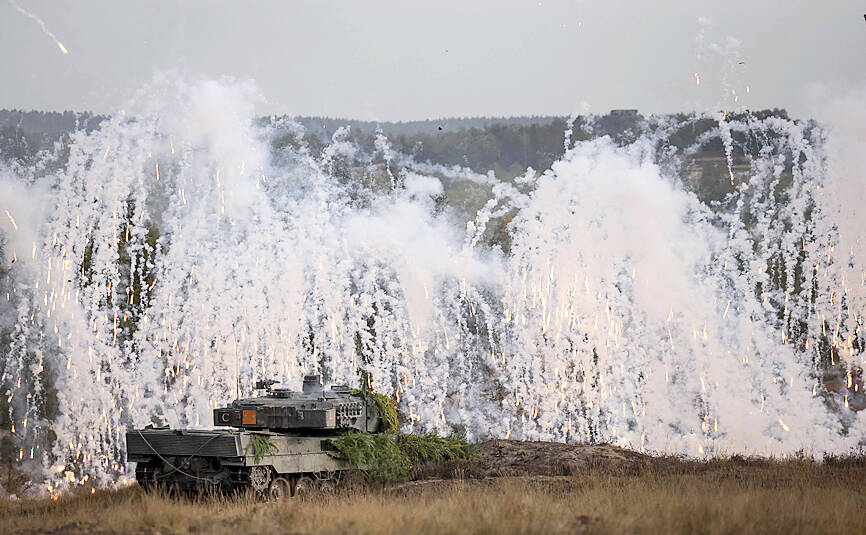Japan, this year’s chair of the G7, expects Russia’s invasion of Ukraine to dominate talks among the world’s major advanced economies, Japanese Vice Minister of Finance for International Affairs Masato Kanda said.
“Sanctions against Russia and support for Ukraine will be a top priority at G7 financial leaders’ meetings under Japan’s chair,” said Kanda, who is to oversee G7 deputy-level talks on economic policy this year.
Among other issues at the top of the G7 agenda would be global debt problems, he said.

Photo: AFP
Kanda’s comments came after the US and Germany on Wednesday announced deliveries of top-of-the-line battle tanks to Ukraine, sweeping aside their long-standing misgivings and signaling a new surge of Western support for an expected counteroffensive against the Russian invasion.
In a televised address, US President Joe Biden promised 31 Abrams tanks, one of the most powerful US weapons.
Shortly before, German Chancellor Olaf Scholz gave the green light to Germany sending 14 Leopard 2 tanks, a decision that is expected to prompt several other European countries armed with Leopards to send their own contributions.
Although Western countries have already sent Ukraine everything from artillery to Patriot anti-missile defense systems, tanks were long considered a step too far, risking a widening backlash from Russia.
However, with Ukraine gearing up for a counteroffensive to push back increasingly entrenched Russians in the east and south, its allies are now scrambling to send the powerful weapons.
On Wednesday, an official from a European country said his government had approved a shipment of cluster munitions — a controversial weapon that Russia has been criticized for using — to Ukraine, and was awaiting German approval of that transfer.
A UN treaty backed by most Western countries bans the use and transfer of cluster bombs, which spread dozens of tiny explosives, and often continue posing a threat long after a conflict ends.
The latest twist in the biggest European conflict since World War II came as Russian forces tightened the screws on Bakhmut, an eastern town that Ukrainian forces have held for months in the face of mass artillery bombardments and what defenders describe as human wave attacks.
Ukrainian Deputy Minister of Defense Ganna Malyar said that Russia, with its “superior number of soldiers and weapons,” was “trying to break through” in the Donetsk region.
Near Soledar, a frontline town that was this month captured by Russian troops, a Ukrainian unit commander said that his troops were outnumbered.
“They use people as cannon fodder,” he said. “We shoot and shoot and shoot, but after five minutes another wave of 20 enemies is coming at us.”

The Taiwanese passport ranked 33rd in a global listing of passports by convenience this month, rising three places from last month’s ranking, but matching its position in January last year. The Henley Passport Index, an international ranking of passports by the number of designations its holder can travel to without a visa, showed that the Taiwan passport enables holders to travel to 139 countries and territories without a visa. Singapore’s passport was ranked the most powerful with visa-free access to 192 destinations out of 227, according to the index published on Tuesday by UK-based migration investment consultancy firm Henley and Partners. Japan’s and

NATIONAL SECURITY THREAT: An official said that Guan Guan’s comments had gone beyond the threshold of free speech, as she advocated for the destruction of the ROC China-born media influencer Guan Guan’s (關關) residency permit has been revoked for repeatedly posting pro-China content that threatens national security, the National Immigration Agency said yesterday. Guan Guan has said many controversial things in her videos posted to Douyin (抖音), including “the red flag will soon be painted all over Taiwan” and “Taiwan is an inseparable part of China,” while expressing hope for expedited “reunification.” The agency received multiple reports alleging that Guan Guan had advocated for armed reunification last year. After investigating, the agency last month issued a notice requiring her to appear and account for her actions. Guan Guan appeared as required,

Japan and the Philippines yesterday signed a defense pact that would allow the tax-free provision of ammunition, fuel, food and other necessities when their forces stage joint training to boost deterrence against China’s growing aggression in the region and to bolster their preparation for natural disasters. Japan has faced increasing political, trade and security tensions with China, which was angered by Japanese Prime Minister Sanae Takaichi’s remark that a Chinese attack on Taiwan would be a survival-threatening situation for Japan, triggering a military response. Japan and the Philippines have also had separate territorial conflicts with Beijing in the East and South China

A strong cold air mass is expected to arrive tonight, bringing a change in weather and a drop in temperature, the Central Weather Administration (CWA) said. The coldest time would be early on Thursday morning, with temperatures in some areas dipping as low as 8°C, it said. Daytime highs yesterday were 22°C to 24°C in northern and eastern Taiwan, and about 25°C to 28°C in the central and southern regions, it said. However, nighttime lows would dip to about 15°C to 16°C in central and northern Taiwan as well as the northeast, and 17°C to 19°C elsewhere, it said. Tropical Storm Nokaen, currently